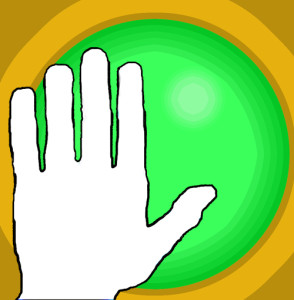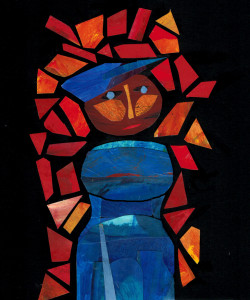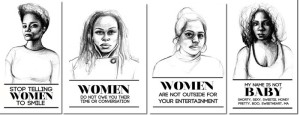 This morning, driving down Milvia Street near Berkeley Way, where palm trees and vine-slung trellises give way to glass and steel and stucco, Raymond (aka Hubby) and I fielded a sterling example of the phenomenon we call “the Berkeley wave.” That’s the wag of the hand that people give you when they’re turning left in front of you or pulling out at a stop sign even though you were there first — a pretend thank you, as if you had chosen to forego your right of way and let the other person in. It acknowledges, on a theoretical level, that the person waving did something wrong. Nothing says “I’m sorry, but not really” like the Berkeley wave.
This morning, driving down Milvia Street near Berkeley Way, where palm trees and vine-slung trellises give way to glass and steel and stucco, Raymond (aka Hubby) and I fielded a sterling example of the phenomenon we call “the Berkeley wave.” That’s the wag of the hand that people give you when they’re turning left in front of you or pulling out at a stop sign even though you were there first — a pretend thank you, as if you had chosen to forego your right of way and let the other person in. It acknowledges, on a theoretical level, that the person waving did something wrong. Nothing says “I’m sorry, but not really” like the Berkeley wave.
Like any community, Berkeley has its own mix of traffic laws, written and unwritten, based on what people are used to and on what police will or won’t enforce. I became aware of such local idiosyncrasies when I lived in Miami, Florida, where a green light did not mean go. It meant wait. Wait for three more cars to run their red light; wait for cars in the intersections to finish their left turns. Then proceed with caution.
One thing I like about Berkeley’s brand of vehicular etiquette is that cars stop for pedestrians, at stoplights, crosswalks, or anything resembling a street corner. That interaction can be an elegant, even balletic, ritual of urban concord. As the motorist, you start decelerating far back from the crosswalk, and the ped strolls forward, giving you a truly friendly wave and a smile of genuine warmth. If you plan it right, controlling your speed, you won’t even have to stop.
In downtown traffic, however, things get trickier. If you’re turning right in Berkeley, a green light again means wait. Wait for a dozen yoga-mat-toting smart-phone readers to take advantage of the walk sign. Once the Don’t Walk starts flashing, though, amblers beware. Unrewarded patience transitions into rage. Drivers take self-righteous pleasure in drifting up to menace the stragglers.
Drivers, in turn, test the pedestrians’ patience on leafy residential streets, where mottled light makes the human figure hard to see. Stuck in traffic, you sometimes get so focused on the erratic Volvo in front of you that the sidewalks fade, slipping into your cognitive blind spot, and you blow right past a hand-holding couple or a dad/jogger pushing a stroller.
Especially in the morning, when children are walking to school, Raymond and I work together to spot the walkers, describing each intersection aloud. Today he was at the wheel as we crept up on Milvia and Berkeley Way, looking for potential street crossers.
To our left, a young woman neared the intersection, walking fast, her hands in her pockets and her sandy-blond braid tucked into the collar of her jacket. She seemed like she might step out into the street, but no, she veered left, staying on the sidewalk. We slowed down long enough to clock a lanky man in an orange shirt — “Hmm, that guy’s not crossing either” — so we pulled through the intersection, only to confront the sandy-haired woman dead in front of us, forging a diagonal path in the middle of the block. As we braked, she flicked her hand at us, then turned her head away.
“There it was!” I sang out to Raymond, “a real Berkeley wave.”
***
“I’m sorry, but not really,” is not something you would have heard in Miami in the 1990s. In fact, you could go a long time in South Florida without hearing any apologies at all. (This may still be the case, in fact, but I’m in no longer in a position to know.) One of the oddly enjoyable things about living in Miami was that, in utter opposition to Berkeley, nobody there was trying to be good. Or anyway, the bar was low. Just by virtue of the fact that they had never done dirty work for Latin American dictators, that they were more upright than the elected officials running Ponzi schemes or leaving threatening messages on the answering machine at the Miami Herald, ordinary people could count themselves as moral paragons.
The reason that this was enjoyable was that the genuinely good people — and I met plenty — never looked for admiration. They belonged to the Yoda school of social action: There is no try, only do. In Berkeley as well as Miami, mentoring and advocacy often spring from deeply held convictions. In Miami, where progressive activism did little to contribute to a person’s social status, where political correctness consisted of denouncing Fidel Castro, it was easier to witness the ways in which altruism arose from personal integrity.
I volunteered, for instance, for a small nonprofit dedicated to raising breast cancer awareness in the Haitian-American community. The founder, twenty-six-year old Jacques, had lost his mother to the disease, in a death that could have been prevented but for social taboos and for shame. Having found a lump, his mother hid her condition and refused Western medicine once she became ill. Ultimately, she changed her mind about anti-cancer treatments, but it was too late. So Jacques and his friends traveled to street fairs and other neighborhood festivities, handing out pamphlets and starting conversations in the hopes of saving someone’s life.
Truth is, I didn’t exactly volunteer voluntarily. I met Rose, Jacques’s associate, during a job I had helping to organize an outdoor even designed to rally the public toward public service and help nonprofits to attract volunteers. I’m not sure how Rose got it in mind that I, a Volunteer ’97 staff member, would personally volunteer with her organization, but she approached me with so much confidence and anticipatory gratitude that I simply went along. Furthermore, I can’t say I contributed all that much. Rose told me they were having an inauguration party and needed food and drink donations. I asked when. She said, “In two weeks.” Not enough time for the method I knew for begging such donations: writing letters to restaurants and then following up with phone calls.
Instead, Jacques hit the pavement a few days before the event, asking door-to-door, and to my astonishment he mustered copious quantities of rice, beans, chicken, salad, hors d’oeuvres, and fruit, as well as scores of boxes of wine coolers, donated by the distributor. The inauguration took place in a gorgeous but decrepit building with marble inlay floors and dusty Venetian blinds with broken slats. My self-appointed function was to improve the facility, straightening and dusting the blinds. I chased bugs out of the restrooms, provided hand soap, and cleaned a dead lizard off of a windowsill (not as uncommon a chore, in South Florida, as you might think).
My greatest contribution, though, was bringing my friend Joel and my friend Wendy, both of them seasoned volunteers, as I was soon to learn. Though they had never met before, they put their heads together and quickly sussed out the problems that could emerge when hundreds of guests sought access to warm bottles of “cooler.” Wendy (or was it Joel?) went out and bought ice and garbage bags, and then we scoured the building for trash bins to convert into ice buckets. Using the wine cooler boxes like concrete blocks, the two of them built a bar and spent the evening serving up cold drinks to a festive crowd.
It’s hardly fair of me, I realize, to juxtapose one of the best days of my Miami years with Berkeley’s everyday shuffle, but I’m compensating for the fact that Berkeley’s flower-child reputation obscure its underlying current of aggressivity. In fact, I marvel at both places and the deep contradictions in each city’s ethos, the jostling of shopping carts amidst aisles of organic produce, the early morning beach clean-up that follows on the late-night mambo. How pushed and pulled we are, at any moment between forces of selfishness — or is it just self-protection? — and unpredictable waves of generosity.



